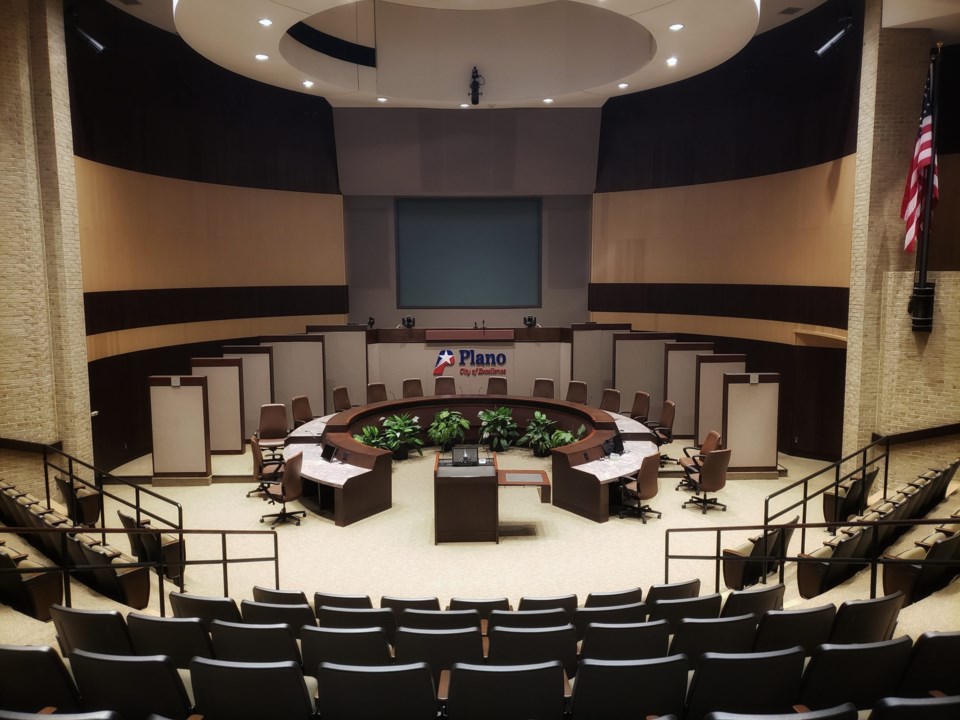Plano citizens and commissioners met once again in the chambers at the municipal center to discuss the fate of the Plano Tomorrow Comprehensive plan on Monday.
One speaker against repealing the plan said she hoped they wouldn’t have to meet there again.
Another said the commission could help end the controversy by recommending the plan be repealed.
For now, the conversation is set to continue in both city proceedings and in the courts.
The Planning and Zoning Commission voted unanimously against recommending to repeal the Plano Tomorrow Comprehensive plan and in favor of evaluating it.
“I don’t want to repeal this plan,” said 1st Vice Chair M. Nathan Barbera. “And I also don’t want to go forward with the current plan.”
In his motion, Barbera recommended looking at the plan’s land use map and some of the neighborhood centers detailed in the land use portion of the plan.
The commission’s decision is a momentary punctuation in the almost four-year-long conversation surrounding the comprehensive plan that the city voted into effect in 2015.
The plan is meant to guide the city’s future in areas like growth and development and encompasses themes like land use, transportation and economic development.
Read: Plano City Council approves $64.6K for master plan for Legacy Drive Park
But over 4,000 citizens were not happy with the plan and submitted a petition in November 2015. City Secretary Lisa Henderson made the decision to not deliver it to the City Council, and the actions following ignited a lawsuit.
Judge Henry Wade Jr, a senior judge acting for the 366th State District Court, ruled Sept. 19 that Henderson does not have to hand over the petition.
“The City of Plano respects our residents’ right to petition their government,” the city said in a Sept. 19 statement. “However, it is the City’s obligation to follow the law. We appreciate and applaud Judge Wade for following state law. We anticipate the court to enter a final judgment dismissing this case. Since the inception of the lawsuit, the City has contended that Texas law preempts the City referendum process.”
Soon after, the plaintiffs and their attorney decided to go to the courts again.
“The next step is the appeal,” Ternan says. “And the appellate court will decide this issue. And I assume that whichever side wins will be happy, and then the other side will try to go to the Texas Supreme Court.”
Beth Carruth, a Plano resident and one of the case plaintiffs, said in a previous interview that she has seen a pattern of developers promising one thing and delivering another, which is part of her objection to the Plano Tomorrow plan.
“We wanted to see smart growth,” she says.
She said she was also concerned about ordinances having been “dumbed down” and limiting the amount of green space developers provided, as well as how close residential places were allowed to be built to the street.
The controversy led citizens to Tuesday night, where a little over 30 people spoke for and against starting over.
Some spoke in favor of keeping the Plano Tomorrow plan and opening it to the amendment process. The land use and growth portions of the plan are meant to undergo an evaluation at least every five years, according to the plan website. The city has also started a process for organizing an ad hoc committee to look at the plan.
Residents in favor of repealing the plan spoke against the idea of an increase in high density housing and apartments in Plano. Speakers noted their safety concerns and crime, requested a focus on the apartments that were already built before bringing in more, and talked about a change in lifestyle due to the city’s growth.
“We’re very important,” said one speaker requesting the plan be repealed. “More important than the paper the Plano Tomorrow Plan was put on.”
Commissioners speaking in favor of keeping the plan cited the work that went into creating it.
“I think it makes good sense to honor the thousands of hours that went into the Plano Tomorrow plan, to keep that in place and work on it rather than throwing it in the trash,” said Commissioner Arthur Stone. “That just doesn’t seem to be a good result for all that effort that all those hundreds if not thousands of people spent putting this together.”
The plan involves more than land use, said Commission Chairman John Muns, and the process of evaluating the plan every five years allows for coming back to it and finding what worked and what did not.
Second Vice Chair Hilton Kong was also against repealing the Plano Tomorrow plan.
“To say that a majority of Plano wants this plan either kept or changed, I think, is disingenuous,” he said. “I think a lot of people here care about it. The majority of Plano doesn’t care. The majority of Plano doesn’t vote about it. They just want to live the good life that they live or whatever life they live and achieve what they have.”
Barbera’s proposal aimed to move forward.
“It’s time to look at all these neighborhood centers and the amount of density that they may or may not allow and to make some amendments to this plan that will bring the city back together,” he said.
As the Plano Tomorrow Plan moves toward enhancement, it still faces the question of its future. The Planning and Zoning Commission’s recommendation will go to the City Council, and the plaintiffs’ appeal will go to the courts.


![Top 5 Reads Of The Week [August 25 - 29]](https://www.vmcdn.ca/f/files/localprofile/images/news/img_1655.JPG;w=120;h=80;mode=crop)

